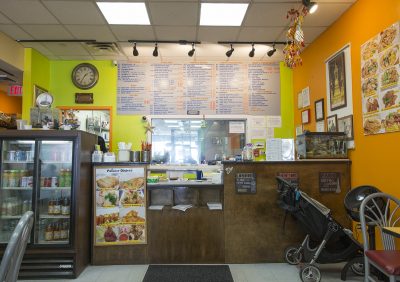Since the pandemic began, the Massachusetts Restaurant Association estimates one in five restaurants in the Commonwealth have permanently closed.

Surviving restaurants adapted to new customer attitudes and government regulations by introducing take-out options, establishing sanitation protocols and utilizing outdoor seating.
However, decreased demand continues to burden operators in an industry with already thin profit margins.
Steve Clark, vice president of government affairs for the MRA, said that when the shutdown began, many restaurants braced for short-term disruptions.
“I remember on March 16, when we got shut down, we thought we were going to be reopening April 9,” Clark said. “And here we are, six months later: we’re still not fully reopened.”
Now, after months of reduced revenue, many restaurant owners are struggling to pay rent, which Clark said is one reason why some have closed.
Some restaurants are covered by the state’s eviction moratorium, which was extended to October 17 in July. Despite this, Clark said many have faced difficulties coming to new agreements with their landlords.
“Some landlords have been great. They’ve been partners with their restaurants, and they’ve renegotiated a percentage of sales for their lease payments,” Clark said. “Other landlords have been very difficult to negotiate.”
As state guidelines continue to shift, restaurants capable of adapting have been the most successful, Melissa Baker, an associate professor of hospitality tourism and management at the University of Massachusetts Amherst, said.
Many restaurants have created or expanded their delivery services. While this has proven effective for quick-service eateries, restaurants that typically emphasize a dine-in or luxury experience have been less successful, Baker said.
“Part of what you are paying for in fine dining is the beautiful cuts and the presentation of the food,” Baker said. “You put it in a to-go box, and it has to travel 15 minutes. The temperature of the food gets colder. The presentation gets jumbled around in transit. And so the quality of the food product is not what you would normally expect.”
Clark said high fees charged by delivery apps like UberEats and Grubhub are an issue for restaurants trying to adapt.
“It’s kind of a double-edged sword for the restaurant,” Clark said. “Yes, you have to pay huge fees, but then also, you get the exposure of being out there.”
Most restaurants operate on profit margins between 3 and 5 percent, Baker said, so any new costs can have major impacts.
Edward Chen, owner of Boston University-adjacent Nud Pob Thai Cuisine, said the commissions charged by delivery apps have significantly impacted his bottom line.
Nud Pob receives about 70 to 75 percent of the money it earns on delivery services, Chen said.
He added that when he charges customers directly through his own website, that loss is minimized to the credit card processing fee of about 5 percent, but many customers either don’t know about the website or prefer the convenience of third-party delivery.
In addition to delivery, Clark said expanding outdoor dining to better accommodate social distancing has buoyed Massachusetts restaurants over the summer.
But as winter approaches, many operators are worried about the potential impact of colder weather, he said.
“We live in New England,” Clark said, “where there’s certain months that are going to be cold and certain months that are not conducive to outdoor dining.”
State guidelines currently dictate that restaurants can only offer outdoor dining until November unless individual municipalities approve a request to extend approval, according to an executive order Thursday by Gov. Charlie Baker.
For Nud Pob, there will be short-term difficulties, Chen said. The return of college students has helped, but the restaurant has still lost money and had to cut non-essential staff.
After the pandemic, Melissa Baker said, restaurants that survive should expect to see a rebound.
“I think when it is safe, you will see a huge uptick in customers wanting to go back to restaurants,” Baker said, “because we’re all longing for it.”
She added that decreased competition following the closures will likely help restaurants recoup losses.
“Those that managed to survive this amount of time, I think, will have some prosperity in the years to come,” Baker said.
In the meantime, Chen said he hopes Massachusetts universities don’t send students home like they did in March.
“If after the new year, more students are able to come back to school, I think I will be fine,” Chen said. “So I just keep watching the news to make sure Massachusetts is not going to shut down and force the schools to go home.”



















































































































